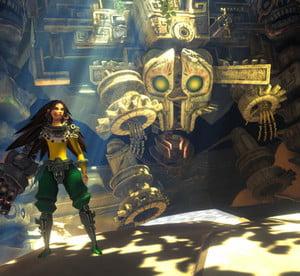For technological and sometimes even cultural reasons, many of the most important names in the history of video games originated in Europe, North America and Asia. However, this has changed, and an increasing number of Latin American studios have entered the gaming industry with high-quality products. Digital distribution has allowed smaller teams to reach global audiences. There are many examples: Video games created in Uruguay, Mexico, Chile, and Colombia are already challenging others created by teams with much more experience.
Ace Team (Chile)
Ace Team is one of the longest-running Latin American studios. Founded in 2002 by brothers Andrés, Carlos, and Edmundo Burdeau, it started with the development of mods for popular games until 2009, when tit made itself known for Zeno Clash, a first-person action title released for PC and Xbox 360.
However, Ace Team would gain more prominence with Rock of Ages, a unique game starring a giant rock that had to destroy castles. From then on, Ace Team games always stood out for their aesthetics, and became known all over the world as they were distributed by companies such as Atlus or Sega.
Ironhide Game Studio (Uruguay)
In Uruguay, there is another studio that for more than a decade has succeeded in a way that has gone unnoticed by many people. This is Ironhide Game Studio, creator of the Kingdom Rush franchise, which after its first release as a Flash game, made the leap to cell phones and found its place in the world.
Kingdom Rush became such a hit that Ironhide signed an agreement with Apple to create a title for the Apple Arcade service: Legends of Kingdom Rush, a spinoff of the main saga that uses tactical strategy game mechanics. but with humor and a much more cartoonish and light style.
Dreams Uncorporated (Colombia)
The 2021 title Cris Tales was released on practically every platform. At first glance, Cris Tales looks like an old-school JRPG, but presented in a way that is in line with current times.
Cris Tales turned out to be a very good game and, for many, it was surprising to learn that the title was developed in Colombia by Dreams Uncorporated. Generally, games of this style are developed in Asia, where the genre was born, but Cris Tales is another example of the level of talent in the region.
Lienzo (Mexico)
In 2018, Mexican studio Lienzo launched a video game with a rare theme: The original Latin American peoples. In the case of Mulaka, the setting revolved around the Tarahumara, a community settled in the state of Chihuahua, Mexico, where the studio is also based.
Mulaka was generally very well-received by critics and the public, and the studio seems to be interested in continuing to explore Mexican indigenous culture, judging by the name of its next game due to arrive in 2022: Aztech Forgotten Gods, an action game that reimagines the Aztec Empire in a modern and almost futuristic vision.
Aquiris Game Studio (Brazil)
The Brazilian team Aquiris Game Studio, established in 2007, has a striking résumé of developing video games for brands such as Cartoon Network and Looney Tunes, which speaks well of the way they work.
But what is perhaps the studio’s greatest success was born from a title of its own: Horizon Chase, an arcade-style racing game inspired by 1980s and ’90s classics such as Top Gear and Out Run. Horizon Chase was originally a mobile-exclusive title, but over the years, it made the leap to PlayStation 4 and PS5 and has been recognized for its impeccable presentation and nostalgic spirit.
Dual Effect and Abstract Digital Works (Chile)
These studios are mentioned together because they have one of the region’s most successful video games released in the last year, an old-school survival horror called Tormented Souls.
Tormented Souls is a return to the roots of Resident Evil or Alone in the Dark, back when the genre was just beginning. The results were so good that any work by the studio will generate expectations because it is not every day that a group of practically unknown developers risks making their first work in a genre so beloved by its fans.
MercurySteam (Spain)
In 2010, Konami released a new entry in their storied Castlevania franchise. However, instead of developing it in Japan, Konami handed it over to a Spanish studio that hadn’t been heard from much until then. The game in question? The remarkable Castlevania: Lords of Shadow, a three-dimensional hack-and-slash reimagining of the Belmont saga.
Lords of Shadow raised the profile of MercurySteam, which in addition to developing a sequel — which was not as well-received as its first part — was asked by Nintendo to develop two titles in the Metroid franchise. The first was Metroid: Samus Returns, a reimagining of Metroid II, and soon it will release Metroid Dread on Nintendo Switch, a new and completely original entry.
Nimble Giant Entertainment (Argentina)
The Argentine studio Nimble Giant Entertainment is one of the few that belongs to a larger conglomerate, in this case, to Embracer Group, formerly known as THQ Nordic.
Nimble Giant Entertainment was born in 2002, and one of its first successes was Regnum Online (now renamed to Champions of Regnum), an MMO-like game that is still going strong in a free-to-play format. In 2017, Nimble launched a shooter game called Quantum League that is inspired by titles like Overwatch.
HyperBeard Games (Mexico)
The Mexican studio HyperBeard Games, founded in 2014, is one of the most respected mobile game developers in the region.
HyperBeard specializes in video games with a very striking and special aesthetic. In addition to creating its own games, it also helps smaller studios to publish, localize, and refine their creations. HyperBeard has a wide portfolio of mobile titles with simple mechanics that have been appreciated by audiences around the world.
The Game Kitchen (Spain)
Until a few years ago, the Spanish studio The Game Kitchen had gone unnoticed — until it launched one of the most interesting and striking indie titles of recent years: Blasphemous, an action game that mixes elements of the classic metroidvania genre with others more typical of Dark Souls.
The setting of Blasphemous was appealing to many Spanish-speaking players, as it deals with topics very typical of the Catholic religious culture that dominates the continent. Blasphemous became a kind of cult hit that, two years after its release, is still being discovered by new players.




